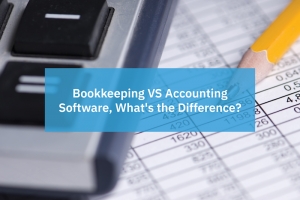عرض العناصر حسب علامة : QuickBooks
7 مهارات محاسبية للمحاسب القانوني
يمكن أن تساعك شهادة CPA في فتح الأبواب لك أمام مجموعة من الوظائف والأدوار القيادية الصعبة في مجال مهنة المحاسبة. ستجد محاسبين قانونيين اليوم يعملون كمدققين داخليين، ومديري تكنولوجيا المعلومات ومحاسبين ضرائب، ومديرين ماليين، ومديرين تنفيذيين لشركات كبرى.
ما الفرق بين برمجيات مسك الدفاتر وبرمجيات المحاسبة
دعنا نتعمق في الاختلافات بين مسك الدفاتر وبرمجيات المحاسبة لفحص ما تحتاجه حقًا لأفضل إدارة مالية. في كثير من الأحيان، يتم استخدام مصطلحات مسك الدفاتر والمحاسبة بالتبادل. لكن هذه مفاهيم مختلفة، تنعكس بوضوح في التكنولوجيا الحديثة.
معلومات إضافية
-
المحتوى بالإنجليزية
Bookkeeping vs Accounting
When you compare bookkeeping vs accounting, they both involve managing financial transactions and accounts. The difference lies in the scale and depth of these processes.
Bookkeeping is simply the recording and monitoring of financial transactions. These include sales transactions, purchases, receipts, and payments made by the company.
Accounting is more complex. Accounting refers to the documentation, interpretation, analysis, classification, and summarization of financial data.
So, while the two are related, they address two different aspects of financial management. Primarily, bookkeeping logs financial information and may involve rolling up the details, while accounting tracks the financial data, manages it, and then uses the data to enhance business. However, this divide has shifted substantially thanks to how they’re used in IT software. To learn more about accounting definitions and terms, check out our accounting vocabulary page.
Bookkeeping Software vs Accounting Software, What’s the Difference?
Bookkeeping software concentrates on the basic components of financial management. You’ll use a bookkeeping system like QuickBooks to document your finances and pay bills. But that’s mostly it. Bookkeeping software focuses on data entry and storage. This is what you use to log your revenue and pay expenses.
Accounting software performs all the functions of bookkeeping in addition to more analytical and actionable accounting functions like cash flow analysis and forecasting. Besides logging and processing debits and credits, accounting systems consolidate key data needed for more proactive financial strategies. What gives accounting software an edge is its proactive use of data.
What’s the Role of Data in a Business’ Financial Health?
One defining feature of both modern accounting and IT technology is data. The use of data even dictates the roles of both bookkeepers and accountants.
Bookkeepers don’t necessarily need an accounting degree or a financial background like an accountant or CPA. They just know proper financial data entry in order to record the transactions properly. This is more of a clerical role, which is still important because accuracy is critical for accounting and finances. However, bookkeeping ends at recording and updating information. This is where the accountant takes over.
Accountants can do bookkeeping work as well, but they are primarily an advisor. Today, the accountant is the curator of your financial data. Accountants take the financial transactions, account information, and other related financial data, and analyze how these details indicate business performance. They then use this financial data to help businesses make the best decisions for success. Accounting software helps accountants do this by capturing and presenting data in a way that helps identify trends and make accurate projections.
[So] Which is the Best Accounting Technology?
It’s pretty obvious that accounting software is better than bookkeeping software. Accounting software is designed to let you do more and visualize your financial health more clearly. You simply get more for what you pay for. Therefore, you should be looking to use or upgrade to a dedicated accounting app, right? Not necessarily.
Accounting applications, while more useful than bookkeeping software, still have several limitations. They can be rigid in how you use, assess, and process financial data or manage transactions. You’ll get the best value and use out of an accounting platform like Accounting Seed than you would a typical accounting app.
Bookkeeping and Accounting: Accounting Platforms
Essentially, an accounting platform combines the goals and functions of bookkeeping and accounting software, but that’s not all. This is because IT platforms are designed for individual organizations to build on top of them. Accounting and bookkeeping applications can be restrictive. They’re not very flexible in how users can work with their own requirements. This isn’t the case with accounting platforms.
Accounting platforms bring a full complement of financial features, the functionality to be adjusted, and an increased emphasis on data control. In summary, the choice is simple. Companies don’t need to choose between bookkeeping or accounting because accounting platforms bring a full-scale accounting solution that will continue to adapt to their needs.
في شركات المستقبل، يتحد الجميع معًا
إنها ظاهرة معروفة أنه عندما يتم تسخير خيول سحب معًا، فيمكنهما سحب ثلاثة أضعاف الوزن الذي يمكن لكل منهما سحبه على حدة. وبالمثل، فإن فريق كرة قدم عظيم، متحدًا في رؤيته وأهدافه، مع تركيز كل عضو في الفريق على دوره الخاص، سوف يتفوق على كل المنافسة في سعيه لتحقيق البطولة.
معلومات إضافية
-
المحتوى بالإنجليزية
In the firm of the future, everyone pulls together
By Alan Anderson, Dustin Hostetler
June 18, 2021, 9:00 a.m. EDT
6 Min Read
Facebook
Twitter
LinkedIn
Email
Show more sharing options
It’s a well-known phenomenon that when two draft horses are harnessed together, they can pull three times the weight that each can pull separately. Similarly, a great football team, united in its vision and goals, with each team member focused on their own role, will outplay any and all of the competition in its pursuit of a championship.
So why aren’t we applying that same synergy to our accounting firms?
Transformation into the firm of the future will require firms to be united in their vision and their goals. This means alignment not only in the services they provide clients, but also how clients experience working with firms, and how staff members experience working at those firms. Business owners, clients, and employees already all expect more than a transactional relationship — they want something that is relevant to their personal wants and needs and that adds value beyond the price they pay. In our work with firms, we have noticed that firms tend to have challenges with alignment that prevent them from working seamlessly together for the benefit of their clients.
Inflo Digital Audit: The profession's first end-to-end digital audit platform
Do more with data, automate compliance, and improve your value with Inflo’s Digital Audit -- the accounting profession's first data driven audit solution...
SPONSOR CONTENT FROM INFLO
Currently, tax and audit tend to operate in silos, not sharing information or firmwide goals. Businesses that work with both tax and audit tend to have a schizophrenic experience in their interactions with an accounting firm. One side will request documents and information that has already been supplied to the other side, but most likely in a different format. One side wants the trial balance in Excel, while the other side wants login information for QuickBooks Online.
This makes a poor experience for clients and staff alike. Staff who move from tax to audit or vice versa may experience cultures as distinct as working for a completely different firm and may be told that the other area is the “Dark Side.”
Compliance services will not be going away, but those services are being priced as commodities. Declining margins, fee pressure, automation, and offshoring mean firms that only provide the bare-bones services of tax returns and audited financials are in a race to the bottom. When that bottom is reached, who will be able to afford to do that work?
Ignoring the keys to the kingdom
Thanks to technology, the current core services of tax and audit give us the keys to the kingdom from which to extract value for our clients. We have tools that let us drill down to the details of every transaction and look under every rock to see what’s there. Simple tools like Excel, and more complex ones that use artificial intelligence, can help us see trends and issues that human eyes, looking at the numbers, cannot detect.
But even with this great store of knowledge at our fingertips, time pressure keeps us from looking under the rocks. Most firms use technology merely to replicate what they did in a paper world, not to free up time to look under those rocks.
Our core services should serve as a springboard for improving our clients’ businesses. Instead, we drop the ball. We could be leveraging our business-mindedness from working with other clients to provide high-value ideas, but we rarely discuss those powerful insights with clients or with others in the firm. Rather than sharing the insights we gain, we move quickly to the next project and the next client.
Our vision for the firm of the future
We believe that to remain viable, accounting firms will need to transform from separate tax and audit departments into a unified whole, focused on advisory services. Leaders of tax and A&A need to come together to merge their firms into a cohesive team, aligned to the same firmwide vision. Both sides need to move together in sync to make transformation happen. This will require changes to people, processes, and systems.
Compliance will remain the base of services — it’s not going away. But this will be tax, audit and accounting with a strategic bent. The annual deliverables — whether that’s a tax return or an audit or both — will be accompanied by additional services. At the base advisory level, regular work and client meetings will be performed both before and after the tax return or audit to establish a rhythm of planning and strategy throughout the year. The next level up will be one-off consulting services on an as-needed basis. These consulting services could include any of the following:
Data metrics and analytics;
KPI monitoring with a custom dashboard;
Succession planning;
M&A support, including business valuation;
Cybersecurity and IT consulting; and,
Bonus plan evaluation.
The firm of the future will also follow the “one firm” model with alignment between tax, audit, and the firm’s vision. Clients will have a better and consistent experience across core services due to increased collaboration between those services. Tax and audit will share information and technology know-how so that everyone is working from the same playbook. All parts of the firm will be moving ahead into the future in synchrony.
Benefits of creating the firm of the future
By creating a unified experience across the firm, everyone — clients, staff, and partners — will have a better experience. Making full use of technology tools will help everyone work smarter, not harder. Instead of just replicating the paper world, innovative uses of technology will introduce new methods for getting the work done effectively and efficiently. Team members won’t be mindlessly filling out the same checklists and forms to get the work out the door faster, but will be empowered to look under every rock, to think, and to make connections. No longer in a race to the deadline, they will leverage the business-mindedness that they have acquired from working with other clients who have the same issues but solve them differently. The goal of every engagement will be to create value for clients through insights and ideas to make their businesses better.
Firms need fewer clients when they layer high-value advisory services onto commodity compliance services. Instead of 100 mediocre clients, maybe you’ll only need 20 great clients. That $800 tax return can be leveraged into $1,500 for tax strategy and planning. An audit with a fee of $20,000 can be doubled when you add in additional advisory and consulting.
Client retention improves vastly when the necessary evil of compliance is transformed into an essential service that helps clients grow their businesses. For clients who see value in what you provide, cost becomes a non-issue. They become sticky to the firm, and not necessarily to a particular partner or manager because the combination of services from a unified firm is greater than any one part on its own.
Besides retaining your best clients, you’ll have better staff retention, an important consideration today when the pipeline for new talent isn’t keeping up with demand. You’ll keep the inquisitive people and the ones who want to make a difference in their clients’ lives. A firm that shares a unitary and forward-thinking vision will be attractive to people who seek work with more meaning.
A unified, forward-thinking firm will also have the resiliency to absorb the future legal, regulatory, and technology changes that we all know are coming. Technology and AI will take over the bottom-level compliance work, but a firm aligned around advisory services will still be able to provide the much-needed and highly valued strategies and insights that our clients themselves will require to remain viable in our rapidly changing world.
Until now, tax and audit have largely worked independently, limiting our ability to propel our clients toward success. But enhanced alignment between these service lines around a common vision will harness a firm’s combined skills and wisdom, to create a firm that is much more than the sum of its parts. Like a team of draft horses, this combined focus will help power the changes that we and our clients will need to thrive in the future.




